In the last that part we saw that Duryodhan hatched a scheme to get rid of the Pandavas and that the Pandavas narrowly escaped death and took refuge in a forest. We also read about Bhim and Hidimba’s marriage and Ghatotkach’s birth.
After some months of hiding, the Pandavas began to think of leaving the forest when Veda Vyas arrived. He consoled the Pandavas and assured them that justice would prevail. He advised them to have patience and to endure the current hardship.
On the advice of Veda Vyas, Kunti and her five sons went to a nearby town called Ekachakra. There they stayed with a Brahmin family, disguised as Brahmins. The Pandavas passed the days by begging alms and participating in payers.
One day, while Kunti was resting at noon, she heard someone wailing inside their host’s house. Intrigued by the unusual wailing, Kunti decided it was her duty to enquire what misfortune had befallen their hosts.
The sobbing Brahmin told Kunti about how the village was cursed by the arrival of a demon called Bakasur. He came into the town of Ekachakra and started killing people and livestock at random. Finally the town elders struck a deal with Bakasur and persuaded him to stay in the forest nearby. The town would send him a cartload of food drawn by two buffaloes, driven by a person. Each family in the town had to take turns to do this. Bakasur would eat the food, the buffaloes and the driver! Kunti immediately guessed that it must be the turn of their hosts to send a driver to Bakasur.
Kunti immediately consoled the weeping Brahmin and told them, “I have five children; so allow me to send my son Bhim to meet the demon. The only request that I will make is to keep this a secret and to not reveal our identity to anyone.”
As per Kunti’s directive, Bhim drove the cart of food to the forest where Bakasur lived. When he saw Bakasur coming out, Bhim began to ear the food meant for Bakasur. Bakasur was furious and attacked Bhim. There ensued a fierce fight between the two and Bakasur was killed. Bhim dragged the demon’s body to the town entrance at night and left it there for the people to witness.
Next morning, the citizens were surprised and elated to see the demon’s dead body. They rejoiced to their heart’s content. When they asked the Brahmin what had happened, the Pandavas’ host only said, “It is all God’s will. Let us thank Him for getting rid of the menace for good.”
The King of Panchal (Drupad) had organised the swayamvar of his beautiful daughter Draupadi. The Pandavas who had heard of Draupadi’s celestial beauty, too wanted to participate in the swayamvar. So, the Pandavas, disguised as Brahmins, travelled to Ekachakra to attend the swayamvar ceremony of Draupadi.
At the swayamvar assembly, the Pandavas sat next to other Brahmins, away from the royal dignitaries as they did not want to reveal their identity. No one in the assembly recognized the Pandavas. Krishna was also present as an honoured guest.
At the appropriate time, king Drupad greeted and honored all the participants and announced that his daughter Draupadi was going to enter the hall. Amidst the sounds of bugles, drums and melodious music, princess Draupadi, accompanied by her brother Dhrushtadyumna, entered the swayamvar hall. As soon she entered, all eyes turned toward her.
Dhrushtadyumna addressed the gathering and said, “Honorable princes, you can see a fish hanging from a revolving wheel fixed at the top of a pole. The reflection of the fish is seen in a wide pan full of oil, placed at the bottom of the pole. The competitor, who hits the eye of the fish while looking at the reflection, shall win the hand of my sister Draupadi.”
A bow and a quiver full of arrows had been placed on the stage for the competitors. The event began and a number of princes came forward and tried their luck one after the other. But none of them were successful. With long faces they returned to their seats.
When Karna’s turn came Draupadi spoke out. She refused to marry Karna because he did not have any royal antecedents. Karna was brought up as the son of a charioteer. A humiliated Karna left the hall in a huff.
Drupad and Dhrushtadyumna were getting worried since all of the princes present at the function had failed. Finally, Arjun sought Yudhistir’s permission to participate in the contest. With his elder brother’s consent, Arjun, still in the guise of a Brahmin walked towards the stage. People were amazed to see a Brahmin trying to achieve a feat in which valiant princes had miserably failed. “He must be crazy!” remarked one of the brahmins!
Staying calm and composed, Arjun picked up the bow and an arrow. He looked at the reflection of the fish in the oil pan and drew the bowstring and shot the arrow. The arrow darted with a twang and pierced the eye of the fish. People could not believe that a Brahmin had mastered archery better the assembled princes.
The princes felt insulted and came forward to harm Arjun. Immediately the rest of the Pandavas grouped together to defend Arjun. Soon enough, all the people realised the strength and skill of the five brothers, the Pandavas. Finally, Krishna stepped in and asked the frustrated princes to take their failure gracefully and the fighting stopped.
Meanwhile Duryodhana, who was also present, guessed that the winner must be Arjun, and the four other Brahmins must be the Pandava brothers he had planned to kill! He was amazed as to how they had escaped the fire at Varnavat.
What happened after this? We will learn about it in the next part.
Dear children, did you observe how selfless Kunti’s thoughts and actions were? She wanted to help her hosts and did not hesitate even for a moment before deciding on sending Bhim to confront Bakasur. When your friends or family members (brothers or sisters) ask you to part with something you have, do you readily give it to them or do you refuse? We have to remember that joy lies in selfless action. Let us inculcate this virtue in ourselves from today itself, shall we?

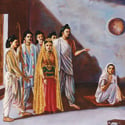 Arjuna’s exile
Arjuna’s exile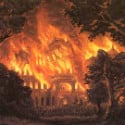 Escape from lakshagriha !
Escape from lakshagriha !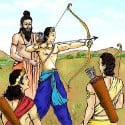 The Princes grow up!
The Princes grow up!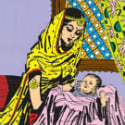 Birth of Pandavas and Kauravas
Birth of Pandavas and Kauravas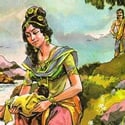 Shantanu and Ganga’s wedding
Shantanu and Ganga’s wedding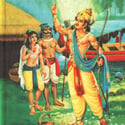 Devavrata becomes Bhishma!
Devavrata becomes Bhishma!